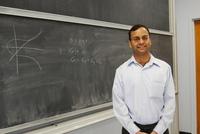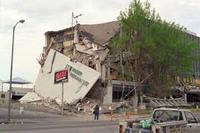-
Natural gas leaks a significant source of green-house gas methane

Methane, a key greenhouse gas, has more than doubled in volume in Earth’s atmosphere since 1750. Its increase is believed to be a leading contributor to climate change. Where is the methane coming from, however? Research by atmospheric chemist Paul Wennberg of the California Institute of Technology (Caltech) suggests that losses of natural gas – regarded as the “cleanest” fossil fuel — into the atmosphere may be a larger source than previously recognized.
-
-
U.K. facing flood crisis, as prime minister warns victims they are in for “long haul”
David Cameron warns flooding victims that they are in for a “long haul,” as the weather service says the weather will get worse this week, leaving thousands more homes at risk. There is a growing anger at the government by residents who complain that in addition to lack of preparation and response – thus, there were many complaints that sandbags intended for the worst-hit areas being “hijacked” and unavailable to stem the rising water – government agencies have not provided enough security after resident were ordered to evacuate, leading to looting of vacant homes. Officials have predicted that thousands more homes will be flooded over the coming days and said restoring the country’s battered rail network could take months.
-
-
Wal-Mart effect: Decline in crime rates slower where Wal-Mart builds

Communities across the United States experienced an unprecedented decline in crime in the 1990s. For counties where Wal-Mart built stores, however, the decline was not nearly as dramatic. A new study examines crime rate in 3,109 U.S. counties in the 1990s, a time of dynamic growth and expansion for Wal-Mart and falling crime rates nationally. During that decade, Wal-Mart expanded in 767 of those counties. The researchers show that Wal-Mart tended to expand in counties with higher than average crime rates, and with numerous crime-related predicators, such as poverty, unemployment, immigration, population structure, and residential turnover. The researchers speculate that much of this relationship occurred because Wal-Mart finds better success building in communities that are less likely to protest the company’s arrival.
-
-
More than 60 percent of California suffers drought conditions, with no relief in sight

The entire west coast of the United States is changing color as the deepest drought in more than a century unfolds. According to the U.S. Department of Agriculture and NOAA, dry conditions have become extreme across more than 62 percent of California’s land area — and there is little relief in sight. “Up and down California, from Oregon to Mexico, it’s dry as a bone,” say a NAA scientist. “To make matters worse, the snowpack in the water-storing Sierras is less than 20 percent of normal for this time of the year.”
-
-
Math is important but should it be compulsory?

There was much discussion recently about making it compulsory for year 12 students in New South Wales, Australia to study some mathematics. Over the past ten years at least, the total proportion of students studying Year 12 math has remained stable at around 80 percent, but the trend around the country has been for students studying math to take lower levels of math. The problem of declining math skills is complex and its solution will not be easy, quick or as straightforward as making math compulsory. At the very least the solution will require qualified math teachers in all math classrooms, an engaging curriculum that has clear relevance to the multitude of pathways that students might pursue, including trades and business as well as science, and clear statements from colleges and universities detailing the essential prerequisites that students require for their programs.
-
-
Coastal areas must adapt to sea-level rise and storm surges or suffer massive damage
A new study presents, for the first time, comprehensive global simulation results on future flood damages to buildings and infrastructure in coastal flood plains. Drastic increases in these damages are expected due to both rising sea levels and population and economic growth in the coastal zone. Asia and Africa may be particularly hard hit because of their rapidly growing coastal mega-cities, such as Shanghai, Manila, and Lagos.
-
-
New software obfuscation system a cryptography game changer

A team of researchers has designed a system to encrypt software so that it only allows someone to use a program as intended while preventing any deciphering of the code behind it. This is known in computer science as “software obfuscation,” and it is the first time it has been accomplished. Previously developed techniques for obfuscation presented only a “speed bump,” forcing an attacker to spend some effort, perhaps a few days, trying to reverse-engineer the software. The new system puts up an “iron wall,” making it impossible for an adversary to reverse-engineer the software without solving mathematical problems that take hundreds of years to work out on today’s computers — a game-change in the field of cryptography.
-
-
U.S. Navy probes exam cheating at school for nuclear power reactor operator
Yet another military service is facing allegations of exam-cheating. Earlier this year, the U.S. Air Force launched a probe into a cheating scandal involving about 100 officersat Malmstrom Air Force Base, Montana, who are responsible for maintaining and operating land-based nuclear missiles. Now the U.S. Navy is investigating about one-fifth of its trainers at the school for naval nuclear power reactor operators in Charleston, South Carolina. The sailors are accused of cheating on written tests required to obtain certification as instructors at the nuclear propulsion school.
-
-
Social networking makes us smarter now, but more stupid in the long run

Does improved connectivity to other people through social networks makes us smarter or more stupid? Some say that connectivity allows us acquire information from other people as well as by direct experience. Many pundits say that in the Internet era, in which we have access to a diversity of information, humankind will learn to make more informed decisions. Others, however, suggest having so much information at our fingertips will limit our ability for concentration, contemplation, and reflection. Controlled tests show that both arguments are correct – but on different tike scales: Being able to copy from other people in vast networks means analytical responses rapidly spread – but only by making it easy and commonplace for people to reach analytical response without engaging analytical processing. The researchers conclude that this tendency to copy without thinking “can explain why increased connectivity may eventually make us stupid by making us smarter first.”
-
-
New state-of-the-art cybersecurity resource available to software developers
Cybercrime is booming; it is an estimated $100 billion industry in the United States and shows no signs of slowing down. Attackers have an arsenal of weapons at their disposal, including social engineering — or phishing — penetrating weak security protocols and exploiting software vulnerabilities that can serve as an “open window” into an organization’s IT environment. Closing those windows requires effective and accessible tools to identify and root out software vulnerabilities. Supported by a $23.4 million grant from DHS’s Science and Technology Directorate (S&T), the Software Assurance Marketplace, or SWAMP, provides a state-of-the-art facility that serves as an open resource for software developers, software assurance tool developers, and software researchers who wish to collaborate and improve software assurance activities in a safe, secure environment.
-
-
Quake-vulnerable concrete buildings in Los Angeles area identified

Researchers have identified nonductile concrete buildings constructed before roughly 1980 in the Los Angeles area. This category of buildings is known from experience in previous earthquakes to have the potential for catastrophic collapse during strong earthquakes. Nonductile concrete buildings were a prevalent construction type in seismically active zones of the United States before the enforcement of codes for ductile concrete which were introduced in the mid-1970s. A companion study estimates that approximately 17,000 nonductile reinforced concrete buildings are located in the most highly seismic areas of California. More than seventy-five million Americans in thirty-nine states live in towns and cities at risk for earthquake devastation.
-
-
Florida mulling banning school collection of students’ biometric information
Some school districts in Florida, including Polk County and Pinellas County, are using scanners to collect fingerprints and hands, eyes, and voice characteristics from students. Pinellas County school district allows students to use palm scans instead of cash to pay for meals in the cafeteria. The collection of students’ biometric information has alarmed many parents who are concerned that students’ identity or personal records may be stolen or sold to private companies. Florida state legislators are debating a proposal which would stop school districts from collecting biometric information from students.
-
-
DARPA makes agency-sponsored software, publications available to R&D community
DARPA has invested in many programs that sponsor fundamental and applied research in areas of computer science, programs which have led to new advances in theory as well as practical software. The R&D community has asked about the availability of results, and now DARPA has responded by creating the DARPA Open Catalog, a place for organizing and sharing those results in the form of software, publications, data, and experimental details. The Web site aims to encourage communities interested in DARPA research to build off the agency’s work, starting with big data.
-
-
New research on ocean conditions to aid Navy planners

The Office of Naval Research Global (ONR Global) announced last week a grant to the University of Melbourne which will provide new insights into ocean conditions — crucial information for Navy planners involved in tactical and strategic decision-making. The goal of the effort is to provide the best information possible on the environmental, or battlefield, conditions, so that tactical and strategic decisions can be properly made.
-
-
Protecting cities from floods cheaper than post-flood damage repairs

Researchers say that global warming is here to stay, and thus it is time to start making plans for dealing with the inevitable flooding which will occur as ocean levels rise as a result of warmer water and melting snow and ice. Approximately a billion people currently live in areas which are most at risk — low-lying coastal areas. It is not likely that towns and cities will be moved farther inland, so other measures need to be taken. The researchers say that flood prevention strategies are well established, for example, building levees, barrier islands, etc., so it is not difficult to draw up estimates for such schemes for individual areas.
-
More headlines
The long view
New Technology is Keeping the Skies Safe
DHS S&T Baggage, Cargo, and People Screening (BCP) Program develops state-of-the-art screening solutions to help secure airspace, communities, and borders
Factories First: Winning the Drone War Before It Starts
Wars are won by factories before they are won on the battlefield,Martin C. Feldmann writes, noting that the United States lacks the manufacturing depth for the coming drone age. Rectifying this situation “will take far more than procurement tweaks,” Feldmann writes. “It demands a national-level, wartime-scale industrial mobilization.”
How Artificial General Intelligence Could Affect the Rise and Fall of Nations
Visions for potential AGI futures: A new report from RAND aims to stimulate thinking among policymakers about possible impacts of the development of artificial general intelligence (AGI) on geopolitics and the world order.
Smaller Nuclear Reactors Spark Renewed Interest in a Once-Shunned Energy Source
In the past two years, half the states have taken action to promote nuclear power, from creating nuclear task forces to integrating nuclear into long-term energy plans.
Keeping the Lights on with Nuclear Waste: Radiochemistry Transforms Nuclear Waste into Strategic Materials
How UNLV radiochemistry is pioneering the future of energy in the Southwest by salvaging strategic materials from nuclear dumps –and making it safe.
Model Predicts Long-Term Effects of Nuclear Waste on Underground Disposal Systems
The simulations matched results from an underground lab experiment in Switzerland, suggesting modeling could be used to validate the safety of nuclear disposal sites.
